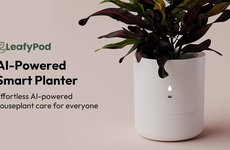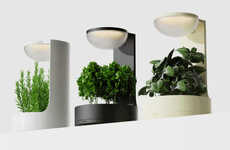
Japanese Plant Authors Blog
Pearl — October 23, 2008 — Pop Culture
References: telegraph
The world’s first plant to blog lives in Japan--more specifically, on a cafe counter in Tokyo. This potted blogger even has a name: Midori-san although it is really a sweetheart plant (Hoya kerrii).
Sensors have been attached to its leaves. When the plant responds to light and human touch, detectors pick up the electronic signals which correspond to its mood and health. The information, combined with weather and temperature is transformed via a computer algorithm into charming, chatty blogs. One entry read, “Today was a sunny day and I was able to sunbathe a lot… I had quite a bit of fun today.” Perhaps the fun it had was plenty of petting by human visitors!
Satoshi Kuribayashi, one of Keio University’s project team members who helped Midori-san communicate, said that they wanted to see if plants could really feel and to monitor their reactions. Midori-san shows there is something to be said for talking to plants.
Sensors have been attached to its leaves. When the plant responds to light and human touch, detectors pick up the electronic signals which correspond to its mood and health. The information, combined with weather and temperature is transformed via a computer algorithm into charming, chatty blogs. One entry read, “Today was a sunny day and I was able to sunbathe a lot… I had quite a bit of fun today.” Perhaps the fun it had was plenty of petting by human visitors!
Satoshi Kuribayashi, one of Keio University’s project team members who helped Midori-san communicate, said that they wanted to see if plants could really feel and to monitor their reactions. Midori-san shows there is something to be said for talking to plants.
Trend Themes
1. Plant Blogging - Plants as bloggers could present new ways of communicating and learning from nature.
2. Mood and Health Sensors - Using sensors to monitor the mood and health of plants could lead to the development of smart gardens and farming techniques.
3. Computer Algorithm - Developing computer algorithms to translate signals from plants into human-readable content presents opportunities in the fields of language processing and AI.
Industry Implications
1. Agriculture - Incorporating sensors and algorithms to monitor the health of crops could improve farming efficiency and increase yields.
2. Education - Plant blogging could be used as an interactive educational tool to teach people about nature and environmental conservation.
3. Technology - Developing sensors and algorithms to communicate with plants opens up new possibilities in the fields of AI and internet of things.
1.8
Score
Popularity
Activity
Freshness























